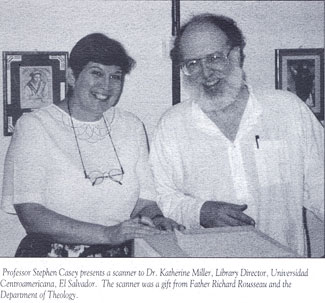Information Update - Fall 1999
From The Library of The Central American University in San Salvador
- (Note: This past summer Reference Librarian, Joe Fennewald, accompanied other faculty and staff from the University of Scranton and Scranton Preparatory School to El Salvador. In preparation of their trip, Mr. Fennewald contacted Dr. Katherine Miller, Directora de Biblioteca Universidad Centroamericana. She expressed the need for books, compact disks and records, art slides, and a computer scanner. Through the generosity of the Friends of the Library, the Library Director and staff, and the University faculty, books, disks and slides were obtained. Father Richard Rousseau and the Department of
 Theology donated the scanner. These materials were then carried by the delegation and given to the Biblioteca UCA. They were greatly appreciated. This is the first trip by the University. Mr is hoped that many more will follow and that we will continue helping the library at the Central American University. What follows is Dr. Miller's history of their library. - Joe Fennewald)
Theology donated the scanner. These materials were then carried by the delegation and given to the Biblioteca UCA. They were greatly appreciated. This is the first trip by the University. Mr is hoped that many more will follow and that we will continue helping the library at the Central American University. What follows is Dr. Miller's history of their library. - Joe Fennewald) - The academic library' of the Universidad Centroamericana "José Simeon Cañas" (UCA) began to function in 1965 with the university itself and bears the name of the first rector of the university and founder of the library itself, Father Florentine Ideate, S.J. It is, by all opinions, easily the best library in all of El Salvador and probably the best in Central America. It is visited annually by more than 300,000 library patrons from schools and universities in El Salvador and by numerous researchers from all over the world.
- By U.S. standards, our library is a small one, but it is the biggest library in Central America. lt has four floors and houses a series of collections ranging from government documents, audiovisuals, serials and newspapers, special historical collections, specialized collections on El Salvador and Venezuela and a general collection of texts and other titles in support of the 33 undergraduate degrees (called a licenciatura, which is a little bit more advanced than a bachelor's degree but not yet a masters degree), four master's degree programs and one doctorate in Iberoamerican Philosophy - the first doctoral program in the country, founded to bring to life the dream of Father Ignacio Ellacuria, S.J.
The Florentino Idoate Library is in the process of being automated, a process begun through the inspiration of Father Martin Baro, S.J., Academic Vice-Rector, before his assassination. The automation of the library is a continuing process not yet completed because of the difficult post-war conditions prevailing in El Salvador. During the twelve years of conflict in El Salvador, there was, of course, little money for maintaining, let alone advancing the development of the UCA library. After the war and the signing of the peace accords in 1991, the arduous process of putting the library in order began during a reconstruction period which was and is almost more difficult than the war years. A grant from the Andrew W Mellon Foundation helped us begin automation and collection development, but things are still not easy. The modernization of the library began almost immediately after the signing of the peace accords and is being carried out by the most. amazing librarians. Salvadoran women and men, students and researchers, are "putting thing in order,"as it were, and we have advanced in the definition of the collections, their automation, acquisitions (an especially difficult process) and making our services known to the university community. - We now have a little over 100 newspapers from El Salvador, Latin America, U.S. and Europe donated by the embassies accredited in the country (Spain, Venezuela, Peru, Mexico, Japan, France, Germany and others), as well as subscriptions to papers such as El Pais and l'Osservatore Romano. Our embryonic Public Affairs Service contains difficult to obtain historic and current government documents of El Salvador, Central America, as well as international documents from the European Community and the United Nations.Our Special Collections represent our library's efforts to obtain, repair and conserve valuable national and Central American historical manuscripts, newspapers and publications as well as the personal libraries of Father Ignacio Ellacuria, S.J. and Father Martin Baro, S.J. Because of our growing reputation as a library which is infinitely careful in the processing, security and accessibility of our collections, more and more families have begun donating their rare and historic family libraries and documents to our library. Among them are the personal libraries and manuscript collections of the well-known Salvadoran jurist, Dr. Mario Castrillo Zeledon, the wonderfully rich library of Salvadoran and Central American literary, political and cultural history belonging to the widow of a beloved literary personage, ltalo Lopez Vallecillos, together with such historical figures as the jurist Dr. Victor Jerez, the collection of Father Rodriguez Jalon, Amadeo Cannessa and others. These and many others are in the process of repair and conservation. We hope to begin to digitalize some of these collections in the future with the help of the scanner donated by the University of Scranton.
- We have also been able to begin an audiovisual section housing the database of Salvadoran legislation donated by the Supreme Court of El Salvador and a complete collection of materials on the current educational reform underway in El Salvador. In this section we also have a tiny burgeoning art and music library which recently received a tremendous donation from the University of Scranton. The section houses tapes of historic interviews with Salvadoran political figures, the homilies of Monsignor Romero, the masses of the liturgical year, as well as Beethoven et al. One of our most popular collections include rock, protest music, blues and Latin American music. Our students are ecstatic about it and we have to crowd listeners into a tiny room - hut they don't stop coming!
- Our Salvadoran Collection is heavily consulted-people come from all over the world to do research on Salvadoran history, culture and politics and then donate copies of their theses or publications. El Salvador is currently undergoing a cultural renaissance, and publications, while small by international standards, have blossomed almost 100% -- that is, from almost zero during the war to new titles each week published through the Ministry of Culture (CONCULTURA).
- During my five years as director of the library, I have certainly learned much more than I have taught. We have 55 full and part-time staff members and over 100 students doing community service commitments for the university, and everyone is making what I can only describe as a heroic effort to move the best library in El Salvador forward so that our students, professors and researchers can have access to all they need to build the country anew and make it better than before the war.
Dr. Katherine Miller,
Directora de Biblioteca UCA
Directora de Biblioteca UCA

